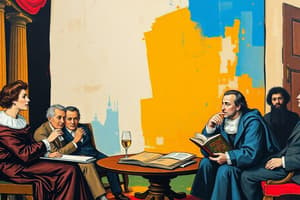Podcast
Questions and Answers
What is Classicism concerned with?
What is Classicism concerned with?
- Examination of inner feelings, imagination, and faith
- Radical change
- Folk traditions
- Scientific observation of the outer world; logic (correct)
Which of the following describes Classicism?
Which of the following describes Classicism?
- Emphasized moderation and restraint (correct)
- Concerned with common people
- Felt that nature should be untamed
- Idealistic
What does Classicism value?
What does Classicism value?
Stability and harmony
What is a key characteristic of Romanticism?
What is a key characteristic of Romanticism?
Which of the following is NOT a characteristic of Romanticism?
Which of the following is NOT a characteristic of Romanticism?
What did Romanticism favor?
What did Romanticism favor?
Classicism believes in following ______ and traditions.
Classicism believes in following ______ and traditions.
Romanticism tended toward ______ and spontaneity.
Romanticism tended toward ______ and spontaneity.
What does Romanticism primarily examine?
What does Romanticism primarily examine?
What aspect of nature did Romanticism appreciate?
What aspect of nature did Romanticism appreciate?
Flashcards are hidden until you start studying
Study Notes
Classicism
- Emphasizes scientific observation and logic to understand the outer world.
- Draws inspiration from classical Greek and Roman literature.
- Pragmatic approach, focusing on practical aspects of life.
- Valued advancements in science and technology.
- Concerned with universal experiences applicable to society.
- Belief in maintaining established standards and traditions.
- Optimistic perspective regarding contemporary society.
- Advocated for moderation, restraint, and balance in expression.
- Appreciated elegance, refinement, and aesthetic harmony.
- Supported a structured social hierarchy.
- Aimed to preserve the aristocracy and elite classes.
- Focused on societal issues, prioritizing the collective over the individual.
- Viewed nature as something that should be controlled and shaped by humans.
Romanticism
- Centers on exploring inner feelings, imagination, and faith.
- Draws from medieval literature as a significant source of inspiration.
- Characterized by idealistic ideals and aspirations.
- Exhibits a fascination with the mysterious and supernatural elements.
- Prioritizes individual experiences and the specific over the universal.
- Seeks innovative expressions in art and literature, breaking traditional forms.
- Often romanticizes the past, viewing it through an idealized lens.
- Tends towards emotional excess and spontaneity in creative expression.
- Values folk traditions and cultural heritage as important influences.
- Desires radical social and political change, favoring democracy.
- Concerned with the lives and experiences of common people.
- Focuses on the individual, celebrating personal identity and uniqueness.
- Advocates for a relationship with nature that respects its wild and untamed aspects.
Studying That Suits You
Use AI to generate personalized quizzes and flashcards to suit your learning preferences.




